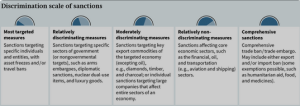A trade embargo and sanctions are economic measures imposed by one or more countries against another country or entities within that country. These measures are typically used as a tool of foreign policy to influence the behavior of the targeted country, address specific issues, or address perceived threats. While both involve restrictions on economic activities, there are distinctions between trade embargoes and sanctions.

Trade Embargo and Sanctions
Table of Contents
ToggleTrade Embargo:
- Definition:
- A trade embargo is a complete prohibition on trade (imports and exports) between two or more countries.
- It may include restrictions on goods, services, and sometimes financial transactions.
- Scope:
- Comprehensive and broad, affecting a wide range of economic activities between the involved countries.
- Objectives:
- Punitive measures to express disapproval or opposition to the policies or actions of the targeted country.
- To isolate the targeted country economically and diplomatically.
- Examples:
- The United States imposed a trade embargo on Cuba in 1960, which includes restrictions on exports, imports, and financial transactions.
Sanctions:
- Definition:
- Sanctions refer to a broader set of economic measures that can include trade restrictions, but also encompass various other limitations, such as arms embargoes, travel bans, and asset freezes.
- Scope:
- Can be targeted or comprehensive, depending on the nature and severity of the issues addressed.
- Objectives:
- Address specific concerns, such as human rights violations, nuclear proliferation, or violations of international law.
- Encourage the targeted country to change its behavior without resorting to military action.
- Examples:
- The United Nations imposed sanctions on Iraq in the 1990s, including trade restrictions, to compel the country to comply with disarmament resolutions.
- The European Union and the United States have imposed targeted sanctions on individuals and entities in response to Russia’s actions in Ukraine.
Key Similarities and Differences:
- Economic Impact:
- Both trade embargoes and sanctions aim to impact the economy of the targeted country, limiting its ability to engage in international trade and commerce.
- Multilateral vs. Unilateral:
- Sanctions can be either unilateral (imposed by one country) or multilateral (imposed by multiple countries or international organizations). Trade embargoes are typically unilateral actions.
- Legality:
- Both trade embargoes and sanctions must comply with international law, and their legitimacy may be subject to scrutiny. The United Nations often plays a role in authorizing and overseeing sanctions.
In summary, both trade embargoes and sanctions are economic tools used in international relations, but trade embargoes are generally more comprehensive and involve a complete prohibition of trade, while sanctions encompass a broader range of economic and diplomatic measures.
